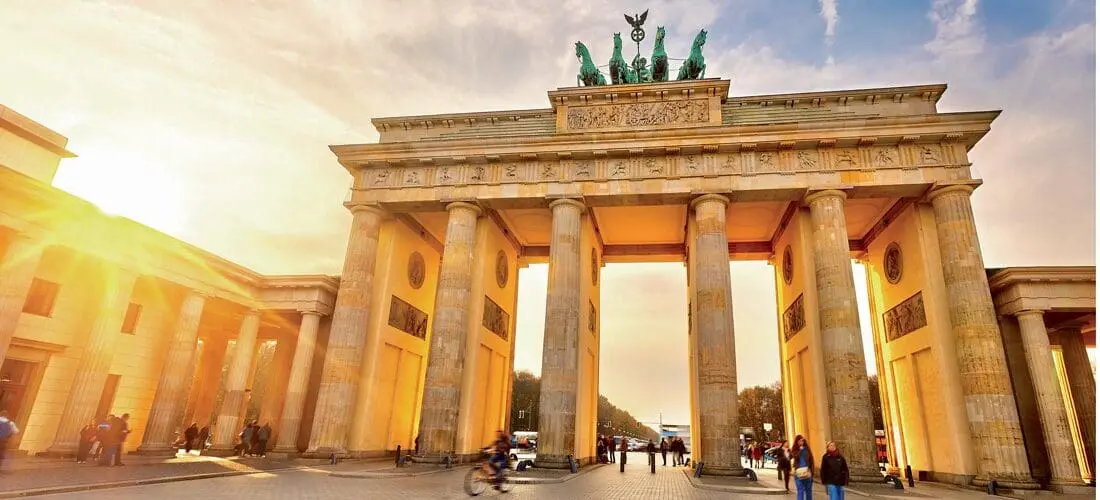Study Abroad
GERMAN STUDY ABROAD – OVERVIEW ABOUT DEUTSCH
- 17/10/2023
- Posted by: New Life
- Category: Experiences in Germany NewLife Activities

What do you think about Germany? What attracts you to this country? Is it the developed economy or the rich and diverse culture? Whether you are looking to study abroad in Germany or just want to visit this wonderful country, let’s explore an overview of the nation with the majestic Alps together with New Life.
1. Overview of Germany
The official name of Germany is the Federal Republic of Germany. It is a Central European country located at the heart of Europe. Germany covers an area of 357,021 km², and its capital is Berlin.
Germany consists of 16 federal states and shares borders with 9 countries, including Denmark, Poland, the Czech Republic, Belgium, the Netherlands, Switzerland, France, Austria, and Luxembourg.

2. Symbols of Germany and Traditional Attire
Every country has its own symbols and unique aspects of traditional attire. In Germany, the national flag features three horizontal stripes in the colors black, red, and gold.

The national emblem of Germany features an eagle, and its colors also consist of black, red, and gold. This is one of the oldest coats of arms in Europe.
German attire reflects the characteristics of Europe. Lederhosen is traditional clothing for men, while Dirndl is the traditional dress for women.
3. Overview of Germany – Political System
Germany operates under a federal parliamentary system. The highest constitutional authority is the Bundestag (Federal Diet). Germany is composed of 16 states, some of which are formed by various administrative districts. The country is governed by its constitution (Grundgesetz).
Germany’s political system is considered quite stable. The political structure is divided into two levels: the federal level, which represents the country externally, and the state level of each individual state. Each level has its own administrative machinery, including the executive, legislative, and judicial branches.
Federal laws are enacted by the Bundestag in conjunction with the Federal Council (Bundesrat).
4. Language
German is the official and predominant language in Germany. It is one of the 24 official languages of the European Union and one of the three working languages of the European Commission. German ranks among the top ten most widely spoken languages in the world.
In Germany, both German and English are commonly used.
5. Culture in Germany
Germany is a country with a long-standing traditional culture, highly regarded as one of the richest in Europe. It is well known for its “reading culture.” Book fairs are held year-round, and Germany boasts many historic libraries. The country is also the birthplace of many talented artists, such as Goethe and Beethoven. Large concerts and music festivals are held annually in Germany. Furthermore, the history and arts scene is distinct, with many historical sites and museums dedicated to war art. Sports, particularly football, are also well-developed in Germany.
6. Economy
Overall, Germany is recognized as one of the leading economies in the world. The country has a robust and rapidly developing economy, with industry, engineering, finance, and technology ranked among the top globally. Germany is famous for its engineering sectors, including machine manufacturing, mechanics, chemicals, information technology, finance, and business management.

7. Education
Germany is renowned for its high-quality education system, ranked among the best in Europe. In the lists of the top 400 and top 700 universities worldwide, Germany boasts a significant number of institutions, second only to the United States and the UK.
Most primary and secondary schools, as well as universities in Germany, are public institutions, and students do not have to pay tuition fees. The quality of education in Germany is recognized globally, featuring modern learning resources and diverse courses tailored to societal needs. The German education system is flexible, providing numerous options for students.
German universities are categorized into two types: Universities of applied sciences and traditional universities. International students studying in Germany benefit from free tuition just like all other students in the country, and there is an increasing number of master’s programs offered in English. This is part of an effort to internationalize German education.
Germany is becoming an increasingly attractive destination for international students, especially from Vietnam.
8. Quality of life
In 2023, Germany ranked 7th out of 87 countries in the Best Countries index by US News & World Report, a US media company that specializes in consumer advice, analysis, and rankings. With its stable political climate, strong economy, advanced education system, and rich culture, Germany is a place where many aspire to live.
9. Germany’s notable achievements
With its rich history and strategic location, Germany boasts a diverse culture and is home to numerous world-class values:
- Famous Perfume brands: Germany is known for renowned perfume brands like Bogner, Escada, Hugo Boss, and Jil Sander.
- Largest population in the EU: Germany has the largest population within the European Union.
- Historic castles: Germany is home to over 20,000 historic castles, making it famous for its architectural heritage.
- Bread variety: With around 300 different types of bread, studying in Germany offers a chance to experience a rich culinary tradition.
- World-famous Sausages: Germany features nearly 1,000 types of sausages, adding to the diverse culinary experiences available.
This overview provides insights into Germany. Follow New Life for more information about life and people in Germany and vocational education opportunities!


